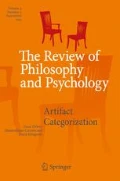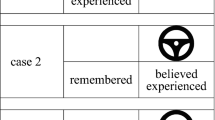Abstract
The aim of this paper is to defend the view that judgments based on episodic memory are immune to error through misidentification. I will put forward a proposal about the contents of episodic memories according to which a memory represents a perception of a past event. I will also offer a proposal about the contents of perceptual experiences according to which a perceptual experience represents some relations that its subject bears to events in the external world. The combination of the two views will yield the outcome that the subject is always an intentional object of her own memories: In episodic memory, one remembers being the subject whose extrinsic properties were experienced in some past perception. For that reason, one cannot misidentify oneself in memory unless one is having an inaccurate memory. Thus, the source of immunity to error through misidentification in memory lies in the nature of mnemonic content.
Similar content being viewed by others
Notes
For the sake of brevity, hereafter I will refer to judgments about the past formed on the basis of episodic memories as ‘memory judgments.’ Also, since our investigation will only concern episodic memory, I will often talk of episodic memories simply as ‘memories.’
I will talk of the ‘content’ and the ‘intentional object’ of an episodic memory indistinctly. What I will mean by this is an event, or property instantiation, which constitutes what the subject remembers in virtue of having that memory. There are at least three different strands in the notion of what is being remembered, of which I am availing myself here: Suppose that an event constitutes what the subject remembers by having an episodic memory. Then, that event would, first of all, make the memory accurate, or correct, if it took place. Furthermore, that event constitutes what the subject is aware of (or, equivalently, what she is being presented with) in virtue of having that memory. And, finally, the event in question constitutes what the subject is in a position to refer to, and think about, by having the memory. Thus, I will be operating with a general notion of content which is meant to incorporate a truth-making aspect, a phenomenological aspect and a cognitive aspect. I acknowledge that the issue of what counts as a component of the content of a memory will depend on whether, and how, the different strands in this notion of content are pulled apart.
For formulations of immunity to error in terms of knowledge and rationality, see (1968, 557) and (1996, 210) respectively. According to Shoemaker (1968, 556), the latter is meant to capture a criterion used by Ludwig Wittgenstein to distinguish two uses of the first-person pronoun (1958, 66–67); a use ‘as subject’ and a use ‘as object.’ There may be other interesting notions of immunity to error through misidentification to be found in Shoemaker’s work. Thus, James Pryor’s (1999) distinguishes two varieties of immunity to error involving the notion of epistemic justification which, Pryor argues, can be attributed to Shoemaker; ‘immunity to which-object-misidentification’ and ‘immunity to de re misidentification.’
In (1970, 269–270).
In (1970, 270).
We seem to have episodic memories that are, in some way yet to be specified, about our own past propositional attitudes, experiences, sensations, actions and physical states such as being in a certain location, or moving in a certain direction. For the purposes of this discussion, it will be helpful to use an umbrella term that refers to states of all of those kinds. Thus, I will be referring to those states as ‘properties.’
In (1968, 563–564).
Notice that the same cannot be said about de facto IEMτ regarding memory: The fact that one’s memories will always originate, as a matter of fact, in properties that one had in the past seems to suffice for one’s memory judgments to qualify as being de facto IEMτ. But that fact is also consistent with the possibility that, in memory, one is only aware that certain properties were instantiated in the past (as opposed to being aware of who, in the past, was the bearer of those properties).
This seems to be, for example, part of the project in which Gareth Evans is engaged in his (1982, 205–267) discussion of self-identification.
In (1970, 273).
In (1971, 15).
In (1982, 248).
In (1997, 241).
This point will turn out to be relevant for an objection to be discussed in note 22 below.
There is an approach to IEM according to which what protects a judgment that has been formed on the basis of a mental state from any error of misidentification is that the subject is not a component of the content of that mental state. Francois Recanati (2007), for example, argues that, when a subject’s judgment about the position of her limbs which has been formed on the basis of one of her proprioceptive experiences is IEM relative to that experience, it is not because the content of the proprioceptive experience is that the subject herself instantiates a certain property; having limbs in a certain position. The content of the proprioceptive experience is only that a certain property is being instantiated; the having of limbs in a certain position. But the subject’s judgment is IEM relative to the experience because the domain of properties experienced through proprioception only includes properties of the subject who is exercising that faculty. Thus, when my judgment is based on a proprioceptive experience, my judgment that my limbs are in a certain position is IEM relative to that experience because any information gained through proprioception can only be about my limbs; not anybody else’s. Now, the point I have made with regards to q-memory suggests that, even though the view that the subject is not present in the content of her memories might yield the result that memory judgments are de facto IEMτ, it falls short of establishing that those judgments are logically IEMτ. For it does not seem logically necessary that the domain of properties experienced through memory only includes properties of the subject herself.
There are at least two reasons to think that we do not need to infer the judgments that we form on the basis of our episodic memories from further judgments about the perceptual experiences that we had in the past and the reliability of our senses at the time. For one thing, the view that we do need to perform such inferences commits us to the claim that subjects who lack, for example, the concept of reliability are not able to form judgments on the basis of their episodic memories; a claim that seems highly implausible. For another, the view that we need to perform such inferences in memory seems to lead to a regress problem. The regress is triggered by the fact that the judgment that our senses were reliable at the time at which we had certain perceptual experiences in the past is itself a memory judgment. For discussion, see [deleted].
The view is not new. It is similar to James Gibson’s ‘ecological optics’ in (1979). To be precise, the view offered here is that if a subject has a perceptual experience that she would express by saying that she is perceiving a certain event, then the intentional object of her experience is her being related in some way to a certain constituent of that event, namely, an object. For the sake of convenience, however, I will sometimes talk of the properties that, according to the extrinsic view, are the intentional objects of our perceptual experiences as relations to events, and I will sometimes talk of those properties as relations to objects that are constituents of events. Hopefully this will cause no confusion.
What is the relevant sense? If the extrinsic view is right, then the subject is an intentional object of her perceptual experiences in the sense that, through those experiences, the subject perceives certain extrinsic properties as being her own. Otherwise, the extrinsic view would not be able to construe some of the examples mentioned above as cases in which a subject sees a wall and a window to her right when she occupies a certain spatial position in the room, or cases in which a subject is going to duck because she sees an object flying at her. What allows the extrinsic view to account for the perspectivity of perception and its immediate salience to action is precisely the fact that, according to the extrinsic view, if a subject has a perceptual experience that she would express by saying that she is perceiving a certain event, then the intentional object of her experience is her being related to that event through one of her extrinsic properties.
An anonymous referee has raised the following concern about this inference. Suppose that one grants that (i) episodic recollection involves the recollection of a past veridical perception, and (ii) one is always an intentional object of one's perceptual experience. Someone who holds that mere q-memories are possible may maintain that, although claims (i) and (ii) are correct, it is nonetheless possible to recollect the past perceptions of a different subject. It seems to me that the considerations about the notion of q-memory discussed in section 2 address this concern. I agree that if mere q-memories are possible, then it is possible for one to have a mere q-memory that originates in a perception that a different subject had in the past. But I fail to see how this type of causal origin has any bearing on the content that one’s mere q-memory would have in the possible situation considered. Assuming that all q-memories (whether genuine memories or mere q-memories) have the same content, and provided that (i) and (ii) are granted, this seems to be a situation in which one’s mere q-memory is inaccurate; not a situation in which its content is different from the kind of content that memories have.
In (1982, 224).
A version of this paper was presented as part of the workshop ‘Connecting philosophy and psychology on episodic memory’ at theUniversité Pierre Mendès, in Grenoble. I am grateful to the audience there for their feedback; especially Stéphane Rousset and Denis Perrin. Denis also provided many useful comments on an earlier draft of this paper, as did two anonymous referees for this journal. Many thanks to all three of them for their help while revising the paper.
References
Aristotle (1972). De Memoria. In Aristotle on memory, ed. R. Sorabji. London: Duckworth.
Evans, G. 1982. The varieties of reference. New York, NY: Oxford University Press.
Gibson, J.J. 1979. The ecological approach to visual perception. Boston, MA: Houghton Mifflin.
James, W. 1890. The principles of psychology. London: Macmillan.
Locke, J. (1975) Essay Concerning Human Understanding, P. Nidditch (ed.) Oxford: Oxford University Press.
McDowell, J. 1997. Reductionism and the first Person’. In Reading parfit, ed. J. Dancy, 230–250. Oxford: Blackwell.
Meinong, A. 1973. Toward and epistemological assessment of Memory’. In Empirical knowledge: readings from contemporary sources, ed. R.M. Chisholm and R.J. Swartz. Prentice Hall: Englewood Cliffs.
Parfit, D. 1971. Personal Identity’. Philos Rev 80: 3–27.
Pryor, J. 1999. Immunity to error through misidentification’. Philos Top 26: 271–304.
Recanati, F. 2007. Perspectival thought: A plea for (moderate) relativism. Oxford: Oxford University Press.
Shoemaker, S. (1996) ‘Self-knowledge and “Inner Sense”. Lecture I: The Object Perception model’, in The first-person perspective and other essays. Cambridge: Cambridge University Press, 201–224.
Shoemaker, S. 1987. Introspection and the self’. Midwest Studies in Philosophy 10: 101–120.
Shoemaker, S. 1970. Persons and their pasts’. Am Philos Q 7: 269–285.
Shoemaker, S. 1968. Self-reference and self-awareness’. J Philos 65: 555–567.
Shoemaker, S. 1963. Self-knowledge and self identity. Ithaca, NY: Cornell University Press.
Von Leyden, W. 1961. Remembering: a philosophical problem. London: Duckworth.
Wittgenstein, L. 1958. The blue and brown books. Oxford: Blackwell.
Author information
Authors and Affiliations
Corresponding author
Rights and permissions
About this article
Cite this article
Fernández, J. Memory and Immunity to Error through Misidentification. Rev.Phil.Psych. 5, 373–390 (2014). https://doi.org/10.1007/s13164-014-0193-4
Published:
Issue Date:
DOI: https://doi.org/10.1007/s13164-014-0193-4



